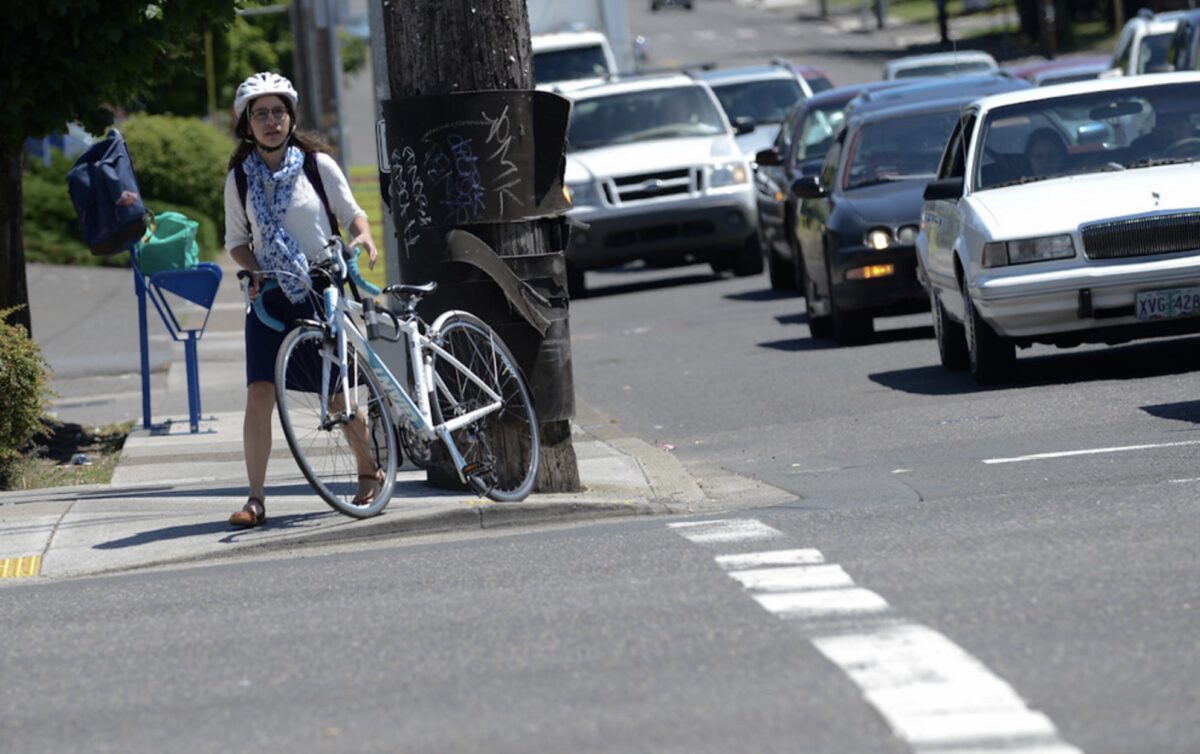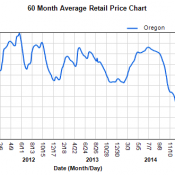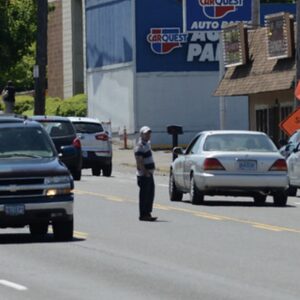
(Photo: J. Maus/BikePortland)
Steph Routh is campaign manager of the Fix Our Streets campaign.

The street that I grew up on in east Portland was not technically part of Portland for the first several years of my life. It remains without sidewalks and boasts a gravel road as the nearest intersection. While there were certainly promises of newly annexed sections of Portland getting all the amenities of a growing city, the service I remember most was sewer hook-up, because it was voice-raisingly expensive (I was young, but I still had ears) and involved a deep ditch that Dad dug himself.
Fixing Our Streets is a program that has kept its promises and is worthy of support, which I don’t say lightly. By the end of this year, the 10-cent gas tax will have funded the full repaving of 40 lane miles, fixed over 400 sections of failing road, connected miles of sidewalks, and delivered another 170 safety improvements. The projects that BikePortland highlighted four years ago as reasons to support the measure in 2016? All of those are in the ground or in process. The sidewalk on Capitol Highway is under construction this summer.
Now the local gas tax is back on the May 2020 ballot as a renewal, with four years of project delivery under its belt; with project selection guided by multiple plans, including Vision Zero and the city’s first updated pedestrian master plan in 20 years.
“Funding for this measure will become available at a time when we will need to invest in economic recovery; and maintenance, street repair, and active transportation projects are great investments in advancing a more resilient future.”
Like the original measure, Measure 26-209 is tied to a specific suite of projects (you can check them out here). This time, over half of those projects are slated for East Portland. These projects include: a build-out of the street lighting system on High Crash Corridors, safer crossings and intersections along gnarly stretches, and an expansion of and retrofit for neighborhood greenways.
Advertisement
Measure 26-209 will also help the city continue to catch up on its significant backlog of maintenance and street repair, which is a win for all modes. While grading gravel streets won’t trigger any ribbon cutting ceremonies, it’s a game-changer for areas with unimproved roadways. Pavement maintenance on decent but declining roads offers a tenfold return on investment. It’s either “pave me now or pay me later,” and that includes taking care of our greenways. Will it fund all of our visions, or even all of our basic needs? No, and for that we need to keep moving forward together. This measure is but one part of a larger solution.
What about the current pandemic? While we address the COVID-19 crisis at hand, we can’t ignore Portland’s future. It’s going to be more important than ever to keep the Fix Our Streets program going, and to put those dollars into efforts that employ Portlanders to do needed safety and maintenance projects on our roads.
Measure 26-209 is a renewal measure, so tax rates will remain the same. It will help knit multi-modal projects into the fabric of east Portland, finally delivering on some of the promises that have been a long time coming. Funding for this measure will become available at a time when we will need to invest in economic recovery; and maintenance, street repair, and active transportation projects are great investments in advancing a more resilient future. This is a sound measure that will humbly make people’s everyday lives better in Portland. Please vote yes on Measure 26-209.
— Steph Routh is campaign manager for Fix Our Streets, Measure 26-209. She is the former Executive Director of Oregon Walks, co-founder of Umbrella and Cycle Wild, and is grateful to be a WTS Portland board member.
— Get our headlines delivered to your inbox.
— Support this independent community media outlet with a one-time contribution or monthly subscription.







Thanks for reading.
BikePortland has served this community with independent community journalism since 2005. We rely on subscriptions from readers like you to survive. Your financial support is vital in keeping this valuable resource alive and well.
Please subscribe today to strengthen and expand our work.
How much money has Fix our Streets taken from the Northwest Natural Gas PAC? Who is also a listed as an advisor on this election campaign? Same PAC that funded $10,000 friends of Christen Draazens Republican walk out. I think readers should review this blog post from 2015 before voting for another gas tax. https://bikeportland.org/2015/12/04/black-friday-gas-taxes-soup-du-jour-169397
Lets stop greenwashing the problems with band aid safety projects.
While I support all of the projects listed above, another regressive gas tax helps us ignore that other tax we really want… congestion pricing. Price the people using our roads who don’t buy gas here. Congestion pricing that would alleviate the need for a freeway.
State highway funds are sucking up all the transport money because HB 2017 created another large loophole for state highway funding with no benefit cost analysis.
Why do we have to cough up another gas tax to pay for a protected bike lane that are now trauma corridors? Oh wait, no there’s no protected bike lanes in this tax project list. Just saying… read the fine print. Your generosity is not going to negate decades of under investment in east Portland. In my humble opinion, we need to force a real conversation about paying for overpriced roads. We need a real green deal, not another gas tax for the democratic machine.
Advisors on this campaign include representatives of The Rosewood Initiative, The Street Trust, 1000 Friends of Oregon, and union leadership. This is a tax renewal, not a new gas tax. I’m glad you support the projects, too.
“1000 Friends”
This organization receives substantial funding from real estate speculators and other out-of-state real-estate profiteers. Not surprisingly, 1000 Friends has been very loyal to their donors by aggressively lobbying for more luxury condo/gentrification.
https://olis.leg.state.or.us/liz/2019R1/Downloads/CommitteeMeetingDocument/159517
Your link goes to a 21 pages of copy and pasted content, with no indication who submitted it. The only part of it that mentions 1,000 Friends of Oregon is a blog post by the United Neighbors for Reform, who of course don’t provide any actual evidence for their claims (or indeed, the claim you’re making).
With funding sources, it’s “yes, and”—not “either/or”.
Even if this package had no good active transportation projects (it does) and no impactful safety projects (can you say better lighting on Glisan, 122nd, and Stark?), this gas tax is going to pay for needed maintenance work that would only otherwise take away from PBOT’s financial ability to spend money on the things you say you care about (e.g. protected bike lanes and the like).
Let’s go for “yes, and”.
I’m surprised at the antipathy you express toward making gasoline, a fossil fuel, more expensive. Seems like in addition to congestion pricing and other sources of revenue, a green new deal should also include very high (and continually growing) taxes on fossil fuels to discourage their use over time. That’s what Europe has done for decades and the result is much lower VMT and car ownership because sometimes their gas tax is several times higher than the base cost of gas.
I agree with others on this thread that this is a “yes, and” situation, not an “either/or”.
Repaving streets just increases the speed on the streets. How is that safety? Why is a tax on Portlands poorest residents considered progress? If the city wants to incentivize alternative to driving, how about taxing people who live in transit rich neighborhoods for the privilege of owning a car? How about taxing parking downtown for people who live two blocks from a MAX line.
PBOT/TriMet/Metro have not created safe streets or alternative means for the residents of East County and the non-gentrified areas of NoPo to access other parts of the city. A gas tax is a punishment for being chronically under-served by the bureaucrats who don’t live in these neighborhoods and don’t care about them.
Vote No. Send the message that working class residents of Portland are sick of the all the regressive taxes the city can dream up.
Please don’t concern troll; the city’s poorest residents are not buying gas.
The revenue source is regressive but the resources are being redistributed from people who drive to people biking, walking, and accessing transit—who in turn tend to be less financially well off (and less white for people walking and taking transit). Don’t let perfect (which does not exist) be the enemy of the good.
(and I recognize people who drive, walk, bike, and take transit are not actually separate groups of people and overlap significantly)
The cities poorest aren’t buying gas? How out of touch can you possibly be?
How can a regressive tax be redistributed to the poor? They are the tax base. This is a case of robbing Peter and then splitting the money between Peter and Paul and then saying to Peter, “I’ve made your life better by giving you this money!”
It’s also naive to think that these street improvements actually empower or enable people to walk, bike, or take transit. These are piecemeal improvements at best. East County is under-served by TriMet. So while it might be easier to walk to the bus stop, you are still being served by a bus that takes 1 + hour to go ten miles. You might be able to cross the orphan highways easier on a bike, but where do you go after that? PBOT hasn’t created any safe biking greenways to access downtown or the industrial areas in the CEID.
Calling someone who lives in an under-served, more diverse neighborhood a “concern troll” for calling out issues with a regressive tax is exactly what I’d expect though. The projects in East County wont do anything to meaningful impact the QOL. It’s just fluff so white “progressives” can feel good as they vote to make Portlands poorest residents subsidize street improvements in the central city and affluent neighborhoods in NW.
As household income goes down, car ownership rates go down, vehicle miles traveled go down, and gas consumption go down. The very poorest people in Portland generally do not own or drive cars, and pay little to no gas tax. You can deny them if you want, but these are the facts.
“As household income goes down, car ownership rates go down, vehicle miles traveled go down, and gas consumption go down.”
Nonsense.
Owning a car is a necessity for Portlanders who live east of 82nd, south east of divison, or northwest of Knowles in NoPo. It’s impossible to get anywhere quickly and reliably without one. Are there people in these neighborhoods who don’t own a car? Sure. But they are few and far between and either would buy one but can’t, or are young and healthy and able to move around the city on a bike.
Only 20% of adults living in poverty DONT have access to a car
https://www.governing.com/topics/transportation-infrastructure/gov-car-ownership-poverty.html
Sure wealthy people might own more cars. Most low income folks aren’t buying a car for their kids 16th birthday, but that doesn’t mean they don’t have to use their car more or that the relative cost of using that car isn’t much higher.
When the rich drive around, it’s a choice. The folks who live n Overlook and Arbor Lodge and then clog up Greeley Ave every weekday are the making the choice to drive. Someone living out in Parkrose doesn’t have that choice. VMT traveled for the wealthy are an extension of their wealth. VMT traveled by the poor are a symptom of their lack of capital.
As for gas, its well known that higher-income folks get a huge break on gas because they have access to newer, more efficient vehicles. Working class folks aren’t able to by Nissan Leaf’s much more a Tesla. I see pretty fair amount of Teslas in Buckman and Sellwood though.
Here is an article from the Brookings institute for ya.
https://www.brookings.edu/opinions/how-higher-gas-prices-hurt-less-affluent-consumers-and-the-economy/
“You can deny them if you want, but these are the facts.”
Post the source for your “facts”. I’m interested in seeing them.
Portland affluent, white urban core does not drive as much as the folks living out in the East County do. I’m interested, so Im going to look at the ACS data.
Either way you slice it, this is a tax on being poor. Your argument reminds of Republicans trying to cut taxes for the rich. “Well the rich already pay the majority of taxes!”
No, the city’s poorest are not buying gas. They are walking and taking transit. Right now. Today. And they are still doing it because they literally cannot afford any other option, pandemic or not, otherwise they’d be using it.
Progressive spending of regressive tax revenue to achieve progressive ends is an approach worldwide and something that has been explained ad infinitum here and elsewhere; it’s not getting a rehash from me. You are right there are better revenue options (e.g. more targeted road use charges with exemptions for certain populations, like you mention). We’ve been talking about them for decades. We aren’t close to implementing them.
P.S.
Let’s meet somewhere in the middle: we both should stop using absolutistic terms. This is not robbing Poor Peter to split the booty between Rich Paul and Poor Peter; it is taking some from both and giving it back to both. My argument (which you quite fairly disagree with) is we are giving more to Poor Peter than we are taking from him. The distortion on my end: it’s also not true that “the city’s poorest are not buying gas”; its more like the city’s poorest (as a group) are consuming disproportionately less gas and road space.
“No, the city’s poorest are not buying gas. They are walking and taking transit. Right now. Today. And they are still doing it because they literally cannot afford any other option, pandemic or not, otherwise they’d be using it.”
It’s okay to live in a bubble, but just don’t assume your bubble gives you insight into how people live.
“Progressive spending of regressive tax revenue to achieve progressive ends is an approach worldwide and something that has been explained ad infinitum here and elsewhere; it’s not getting a rehash from me. ”
What’s the progressive end here? Like I said, this wont improve mobility because it’s being done in the usual style of “islands of improvement”. It wont be any easier for someone in East County to get around after these projects than it is right now. Still no reliable, fast bus service, still no real greenways, still no walkable neighborhoods. Traffic will still be speeding down 122nd.
“You are right there are better revenue options (e.g. more targeted road use charges with exemptions for certain populations, like you mention). We’ve been talking about them for decades. We aren’t close to implementing them.”
We aren’t close to implementing them because PBOT doesn’t have the backbone to do the right thing. It’s much easier to push projects that disproportionately harm the poor when it comes to the “common good” than it is to put that on the rich. It’s silly that ANY money from a regressive gas tax is going to improve neighborhoods that are transit/bike/walking rich.
“it is taking some from both and giving it back to both. ”
Right. Like every flat tax, it hurts one more than the other. While it sounds nice and equitable to say we are taking some from both and giving it back to both, the reality is that we are taxing Poor Peter at a much higher rate than Rich Paul.
“its more like the city’s poorest (as a group) are consuming disproportionately less gas and road space.”
1. How much of the population making under $10k a year are independent? There are a lot of high school and college students making under $10k who don’t drive. As you can see from that same table folks under 24 are under represented in driving to work.
2. The chart you linked to DOES NOT say that low income people are using less gas. It talks about their mode of travel to work. It doesn’t say how far they go, it doesn’t say how efficient their vehicle is.
3. $10k is extreme poverty. Someone making that couldn’t stay housed in any part of Portland. When I say poor, I’m saying inclusive of households making under $35k a year.
4. This does not say anything about where low-income people live. All we have is income. No information about dependents, no information about living location. Someone making $20k a year but their parents pay the rent is a lot different than someone making $40k and trying to get by on their own.
Voting NO on this cash grab. And so called “poor” folks out here in east PDX are driving plenty.
Also, don’t be surprised when this tax once again fails to get a majority in any working class neighborhood in Portland.
It’ll probably pass though because the affluent, white, “progressive” neighborhoods have never met a tax that they didn’t feel comfortable making working class people pay
Steph, how long would this renewal last? Would we need to vote on this again in the future?
While most of us would agree that congestion pricing is a good policy we do not have it in place yet. A tax on gas already exists and is easy to implement. This is a pretty easy YES Vote for me.
Good question, Kiel. This renewal is for four years. And agreed that this is a “yes and” conversation. The gas tax is one of diminishing returns as we make advances in climate policies relating to transportation; this renewal focuses on funding projects that move multi-modal projects forward while other funding conversations advance towards a more resilient future.
It’s good to talk about what could be better, and if we want the safety improvements we also need to support this.
The “Yes and ” position should watch the new Michael Moore video “Planet of Humans” on gaslighting advocates. We can’t have it both ways. If we build programs on top of gas taxes we are creating another pool of program managers that need to keep their jobs. Not all of us get the same hand outs. At this point NURSES are corkscrewing gun nutters at hospital for vehicular access. And we get the status quo from humble progressives. Safe routes for who, again? This is fossil fuel infrastructure.
https://www.youtube.com/watch?v=Zk11vI-7czE#action=share
I wouldn’t trust Michael Moore as an authority on any subject. The man descended into a purveyor of utter bulls*** long ago.
So called green energy is a complete load of BS. I’m just surprised somebody like Moore was the one to show just what a sham it really is.
The “stop reproducing” message must have really ruffled some feathers though.